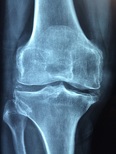A blog for all things dog-related: training, behavior, fun new doggie items, veterinary information and, of course, ways to enhance your relationship with your best four-legged friend!
So what kind of treatment plans are available for this sort of thing? Dr. Selzner says, “Unfortunately, most of the time, there is nothing that we can do to reverse the degenerative changes in the joints. However, we CAN try to prevent progression of arthritic changes and provide relief of the associated pain and inflammation through several methods. The approach to treatment of arthritis is often referred to as ‘multi-modal therapy.’ This means that instead of only investing in one means of treatment, we often have to focus on several aspects of treatment.” “Although surgery and medications may be indicated to help alleviate pain and discomfort in some cases of degenerative joint disease / arthritis, there are also numerous neutraceutical supplements (products which are not medications, but rather nutritional supplements with medicinal properties) available through your veterinarian’s office that could help. Many veterinarians may start patients with early arthritis on these supplements before pursuing other modes of therapy,” explains Dr. Selzner.
“Many veterinarians start large breed dogs (who are more prone to arthritis later in life) on glucosamine and chondroitin supplements at a young age before there is a noticeable problem. These supplements can help lubricate joints and improve mobility and, when given long-term, can help protect and improve the health of the cartilage in the body’s joints. Cartilage lines the joints and in a way, works as a shock absorber,” says Dr. Selzner. “It is best to administer products that have been studied extensively in dogs and are known to be effective in dogs, like Dasuquin, Cosequin, and Phycox. Adequan (Polysulfated glycosaminoglycan) is an injectable supplement which is administered by your veterinarian and it helps prevent further breakdown of cartilage in the joints. Omega 3 fatty acids have also been shown to improve joint health by reducing inflammation within the body. Welactin and Free Form Snip Tips are two brands recommended by veterinarians. Furthermore, there are several other neutraceuticals that can also be used, including enzymes, antioxidants, etc.” Again, please speak to your veterinarian about the best option for your pet. Other Anti-Inflammatory Treatments As arthritis progresses (and for more severe cases), while supplements may ease the ache a bit, your dog may require treatment with systemic anti-inflammatory medications. Dr. Selzner advises, “Most veterinarians choose non-steroidal anti-inflammatory medications (NSAIDs) such as Rimadyl, Deramaxx, Metacam, and Previcox to name a few. These are dog-safe anti-inflammatories.” With these treatments, it’s critically important for a veterinarian to monitor the process. “Although NSAIDs are beneficial in treating arthritis, liver and kidney enzymes have to be monitored through blood tests, as these drugs ask your dog’s liver and kidneys to work slightly harder to break down and metabolize the drugs.” Since there are so many over-the-counter pain reliever medications available for us humans, you may feel tempted to pacify your dog with some of them. But Dr. Selzner warns, “You should NEVER give any human over-the-counter non-steroidal anti-inflammatory drugs to your pets. Human products such as ibuprofen, acetaminophen, aspirin, naproxen, etc. are not safe for your pets and are actually toxic!” What if you don’t want to give your dog medications – are there natural ways to battle arthritis? “There are many alternative forms of treatment such as acupuncture and laser light therapy (which uses light energy to stimulates cells in the body to promote blood flow, decrease pain, and decrease inflammation) that can be considered,” says Dr. Selzner. For some other natural joint supplements, see my blog post “Supporting Your Dog’s Joints Through Natural Supplementation.”
Let’s not forget the many benefits to an appropriate exercise routine on a dog’s health. “Exercise can be extremely beneficial in the management of arthritis, as it promotes the circulation of blood, strengthens muscles, and increases joint mobility. Although exercise is helpful, not all forms of exercise are suitable for every dog - hence, please check with your veterinarian to determine the most appropriate exercise regime for your dog.” This way, you don’t run the risk of overexertion and strained muscles or lameness. And because exercise is something that you and your dog can do together, it can continue to enhance your bond.
0 Comments
Your comment will be posted after it is approved.
Leave a Reply. |
AuthorMaria Huntoon, CBCC-KA Archives
April 2020
Categories |





 RSS Feed
RSS Feed






